MercoPress. South Atlantic News Agency
Tag: Alvaro Uribe
-
Monday, October 17th 2016 - 09:57 UTC
“Spoiler” Uribe replies to the NYT editorial: “an offence to the millions of Colombians who voted NO”

Colombia's Democratic Center party founded by former president Alvaro Uribe criticized on Sunday The New York Times for a recent editorial accusing the ex head of government of “blocking” the peace process in the country and calling on him to act as “a true statesman”. The party said that the NYT editorial constitutes “an offence to the millions of Colombians” who voted against the terms of the peace accord between the government and the main guerrilla group, FARC.
-
Thursday, October 6th 2016 - 11:50 UTC
Uribe demands overhaul of a “weak” deal; peace talks resume in Havana
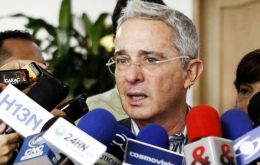
Colombian President Juan Manuel Santos said Wednesday peace with the FARC rebels is “close,” but his top opponent demanded an overhaul of a “weak” deal rejected by voters in a referendum.
-
Tuesday, October 4th 2016 - 10:20 UTC
Colombia the day after: Uribe holds the key to a peace deal, but much harsher on FARC commanders

Colombia's president tried Monday to keep alive an agreement to end Latin America's longest-running war after a shocking rejection by voters, but his opponents made clear their price for joining the effort will be steep.
-
Monday, October 3rd 2016 - 08:52 UTC
Colombians turn their back on peace deal: Santos and FARC allies in rejection
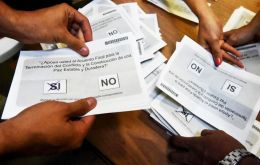
Colombian voters appeared to have shocked their government, world leaders and pollsters by blasting away its hopes for a historic peace deal with the Marxist FARC rebels on Sunday, near-complete referendum results showed. Reversing the trend of earlier opinion polls, voters appeared to have narrowly defied the government's pleas to ratify its plan to put 52 years of bloody conflict behind them within months.
-
Friday, September 30th 2016 - 11:05 UTC
Colombia peace referendum has national support but regional vote shows battle lines
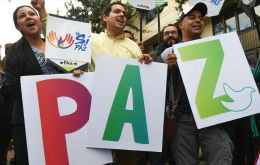
Two public opinion polls released on Wednesday indicate that the recently peace deal between the government with the FARC is likely to be ratified by Colombia’s electorate on Sunday. President Juan Manuel Santos and FARC leader “Timochenko” signed peace on Monday, but before this agreement can be fully ratified, Colombians will vote on the deal in a referendum first.
-
Tuesday, September 27th 2016 - 06:48 UTC
Colombia peace accord challenges: Sunday's referendum and 7.000 combatants laying down their weapons

As thousands of Colombians offered both hope and skepticism, the government of Colombia and FARC Marxist rebels who fought a bitter civil war for more than half a century signed a historic peace accord on Monday, closing the Western Hemisphere's longest armed conflict. The deal will have a first test next Sunday when the Colombian people will vote on a referendum.
-
Friday, August 26th 2016 - 07:28 UTC
Colombia launches referendum campaign; doubts remain on peace accord terms

After sealing a historic peace accord with the FARC rebels, the Colombian government launched a campaign on Thursday to persuade voters to adopt it in a referendum on October 2.
-
Tuesday, February 2nd 2016 - 05:49 UTC
FARC will enter politics once peace deal is signed, announces top guerrilla leader
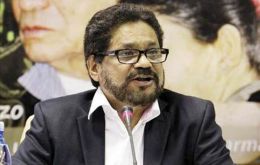
Colombia’s FARC rebel guerrillas will enter politics and seek alliances with other parties after it signs a peace deal with the government, its secretive leader said, despite rebel fears they may be targeted by right-wing armed groups..
-
Saturday, June 6th 2015 - 07:48 UTC
Colombian congress bars presidential re-election; 70% of public opinion supports decision
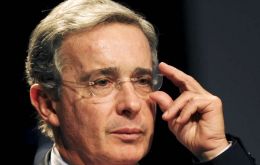
Colombia’s Congress has voted to bar presidents from seeking re-election, a move backed by President Juan Manuel Santos that undoes a law passed by his predecessor and rival Alvaro Uribe. The decision also marks a difference with the ongoing Latin American trend of successive re-elections, when not unlimited.
-
Monday, July 21st 2014 - 07:25 UTC
Colombian president inaugurates the “Congress of peace” to end 50 years of war
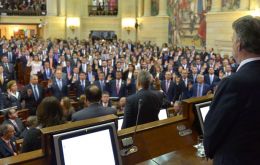
Colombian President Juan Manuel Santos opened a new session of Congress on Sunday, calling on lawmakers to back government efforts to strike a peace deal with the FARC rebels to end 50 years of war. Members of Congress were sworn in during the ceremony in central Bogota.
